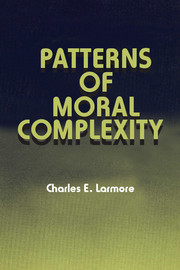Book contents
- Frontmatter
- Contents
- Preface
- Acknowledgments
- Chapter 1 MORAL JUDGMENT – AN ARISTOTELIAN INSIGHT
- Chapter 2 THE LIMITS OF NEO-ARISTOTELIANISM
- Chapter 3 LIBERALISM AND THE NEUTRALITY OF THE STATE
- Chapter 4 THE POLITICAL ORDER AND PERSONAL IDEALS
- Chapter 5 POLITICAL ROMANTICISM
- Chapter 6 THE HETEROGENEITY OF MORALITY
- CONCLUSION
- Notes
- Bibliography
- Index
Preface
Published online by Cambridge University Press: 05 June 2012
- Frontmatter
- Contents
- Preface
- Acknowledgments
- Chapter 1 MORAL JUDGMENT – AN ARISTOTELIAN INSIGHT
- Chapter 2 THE LIMITS OF NEO-ARISTOTELIANISM
- Chapter 3 LIBERALISM AND THE NEUTRALITY OF THE STATE
- Chapter 4 THE POLITICAL ORDER AND PERSONAL IDEALS
- Chapter 5 POLITICAL ROMANTICISM
- Chapter 6 THE HETEROGENEITY OF MORALITY
- CONCLUSION
- Notes
- Bibliography
- Index
Summary
The goal of theory must be to discern some order in the welter of phenomena. This is as true of moral philosophy as it is of other forms of inquiry. However, moral theory in general and political theory in particular have been burdened, from their Greek beginnings through modern times, with unnecessarily simplistic notions of the overall order that they can expect to discover. As a result the genuine problems confronting moral philosophy have too often gone not merely unsolved, but also unperceived.
The aim of Patterns of Moral Complexity is to recover some of the complexity of the phenomena with which moral philosophers ought to deal. Of course, bare appeals to unmastered complexity are themselves rather simpleminded. Everyone knows that there is always something more to learn. So I must insist that the types of complexity with which I shall be concerned are fundamental and pervasive, not confined to any specific moral problem, but constitutive of morality in general. For this very reason I am reluctant to define at the outset just what I mean by “morality,” since such definitions have usually turned out to be nothing less than theories that deny these very forms of complexity. What I have in mind will be best understood if I begin with at least a rough description of those neglected dimensions of morality that will be my theme.
The two dominant traditions of modern moral philosophy, Kantianism and utilitarianism, have been at one in seeking a fully explicit decision procedure for settling moral questions.
- Type
- Chapter
- Information
- Patterns of Moral Complexity , pp. ix - xivPublisher: Cambridge University PressPrint publication year: 1987
- 1
- Cited by



